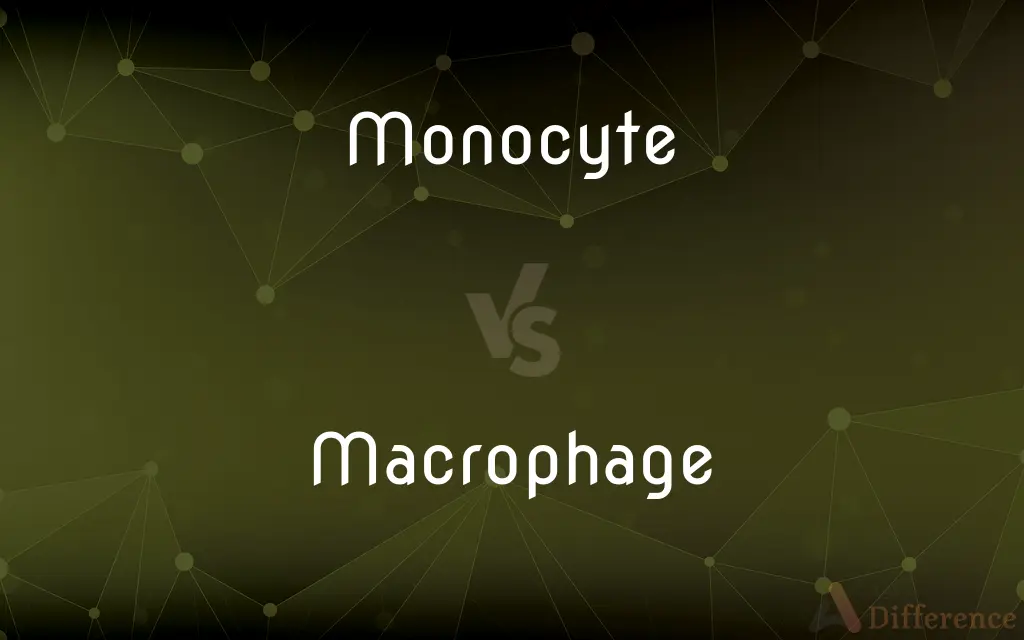Monocyte vs. Macrophage — What's the Difference?
Edited by Tayyaba Rehman — By Fiza Rafique — Updated on March 20, 2024
Monocytes are circulating white blood cells that play a key role in the immune response, while macrophages are derived from monocytes and act as first responders to infection in tissues.

Difference Between Monocyte and Macrophage
Table of Contents
ADVERTISEMENT
Key Differences
Monocytes circulate in the stream for about 1 to 3 days before moving into tissues throughout the body. On the other hand, once monocytes migrate into tissues, they differentiate into macrophages, which can reside in tissues for months or even years.
Monocytes play a role in the immune system by responding to inflammation and preparing sites for tissue repair. In contrast, macrophages have the added function of engulfing and digesting cellular debris, foreign substances, microbes, and cancer cells in a process called phagocytosis.
Monocytes are precursors to macrophages and dendritic cells, indicating their flexibility in the immune response. Whereas macrophages are more specialized, adapting to the specific needs of the tissue environment they reside in, such as in the lungs, brain, or liver.
Monocytes are typically identified in the body through specific surface markers using flow cytometry, a technology that allows for the analysis of physical and chemical characteristics of cells. Macrophages, however, are usually identified based on their location in tissue, their morphology, and their ability to engulf particles.
Comparison Chart
Location
Bloodstream
Tissues
ADVERTISEMENT
Function
Immune response, inflammation
Phagocytosis, immune regulation
Lifespan
1-3 days in blood
Months to years in tissues
Origin
Bone marrow
Derived from monocytes
Identification
Flow cytometry (surface markers)
Tissue morphology, engulfment ability
Compare with Definitions
Monocyte
Monocytes prepare sites for tissue repair.
After injury, monocytes are among the first responders for tissue healing.
Macrophage
Macrophages can reside in tissues for a long time.
Tissue macrophages can be found in the liver as Kupffer cells.
Monocyte
Monocytes are a type of white cell important for immune defense.
An increase in monocytes often signals an infection.
Macrophage
Macrophages are immune cells that engulf and destroy pathogens.
Macrophages play a crucial role in the body's defense against bacteria.
Monocyte
Monocytes differentiate into macrophages and dendritic cells.
The monocyte's ability to differentiate plays a crucial role in immune response.
Macrophage
They are found in tissues and are derived from monocytes.
Once in the tissue, monocytes differentiate into macrophages.
Monocyte
They are identified by specific surface markers.
Scientists use flow cytometry to distinguish monocytes from other cells.
Macrophage
Macrophages are essential for phagocytosis and immune regulation.
Macrophages initiate the repair process after an infection is cleared.
Monocyte
A type of granular leukocyte that functions in the ingestion of bacteria
Macrophage
They adapt to their specific tissue environments.
Brain macrophages, or microglia, have unique properties.
Common Curiosities
What functions do macrophages serve?
Macrophages engulf and digest cellular debris, foreign substances, and pathogens, and play a critical role in immune regulation and tissue repair.
Where are monocytes found?
Monocytes are found in the stream.
What are monocytes?
Monocytes are white cells that play a role in the immune system, particularly in fighting off viruses and bacteria.
What is the role of monocytes in the immune system?
Monocytes respond to inflammation and infection, preparing sites for tissue repair and participating in the immune defense.
Where do macrophages reside?
Macrophages reside in body tissues, including the lungs, brain, and liver.
What are macrophages?
Macrophages are a type of white cell found in tissues, involved in destroying bacteria, cell debris, and other harmful organisms.
What triggers the differentiation of monocytes into macrophages?
The migration of monocytes into tissues and the specific signals within those tissues trigger their differentiation into macrophages.
What is the lifespan of macrophages in tissues?
Macrophages can live in tissues for several months to years, depending on the tissue type and environmental factors.
Can monocytes become other types of cells?
Yes, monocytes can differentiate into macrophages and dendritic cells, showing their versatility in the immune response.
Why are macrophages important for tissue repair?
Macrophages are important for tissue repair because they clear debris and pathogens from the site of injury, initiate repair processes, and regulate inflammation.
Do macrophages have specialized functions?
Yes, macrophages have specialized functions that adapt to the specific needs of the tissue environment they are in.
How are macrophages identified?
Macrophages are identified based on their location in tissues, their morphology, and their ability to engulf particles.
How are monocytes identified?
Monocytes are identified by specific surface markers using techniques like flow cytometry.
Share Your Discovery

Previous Comparison
Access vs. Obtain
Next Comparison
Tributary vs. RiverAuthor Spotlight
Written by
Fiza RafiqueFiza Rafique is a skilled content writer at AskDifference.com, where she meticulously refines and enhances written pieces. Drawing from her vast editorial expertise, Fiza ensures clarity, accuracy, and precision in every article. Passionate about language, she continually seeks to elevate the quality of content for readers worldwide.
Edited by
Tayyaba RehmanTayyaba Rehman is a distinguished writer, currently serving as a primary contributor to askdifference.com. As a researcher in semantics and etymology, Tayyaba's passion for the complexity of languages and their distinctions has found a perfect home on the platform. Tayyaba delves into the intricacies of language, distinguishing between commonly confused words and phrases, thereby providing clarity for readers worldwide.
















































